By Don Valentine
On July 18, 1863, just outside of Charleston, the 54th Massachusetts Volunteer Regiment charged the Confederate Army fort. Sergeant Carney courageously retrieved the American flag from the unit’s flag bearer who fell after being shot. The National Park Service Archives wrote, he “…continued to march it forward pressing his wound with one hand and with the other holding up the emblem of freedom. Despite multiple serious wounds, Carney pushed forward and planted the flag upon the parapet. When Union forces had to retreat, Carney continued to carry the flag until he made it to friendly lines and handed it to another member of the 54th Massachusetts.” Sergeant Carney proudly exclaimed, “Boys, I only did my duty; the old flag never touched the ground!”
The all-Black 54th unit from Massachusetts was the first regiment formed after Lincoln’s call for Black troops. Sergeant Carney and the other men in the unit fought with valor and gallantry. The Massachusetts Historical Society recorded, “…after several days with little sleep, food or water, the regiment was instructed to lead the attack against Fort Wagner on Morris Island. In the disastrous assault led by Colonel Shaw, the 54th suffered very heavy losses, including the loss of their commander, and nearly half of the men present were killed…” That two hour fight, often with hand to hand combat, was a winner for Black recruitment. The Boston African American Historic site gave this summary, “Through their heroic, yet tragic, assault on Fort Wagner, South Carolina in July 1863, the 54th helped inspire the enlistment of more than 180,000 Black men…a boost in morale and manpower that Lincoln recognized as essential to the victory of the United States and the destruction of slavery throughout the country.”
Sergeant Carney was born a slave in 1840 and escaped Norfolk to freedom via “The Underground Railroad.” He eventually rejoined his family in Massachusetts, but as a young slave he was secretly taught to read and write by a local minister at the age of 14. The plan to join the ministry of the Lord was interrupted by the war. In a letter dated October of 1863, Carney wrote, “I had a strong inclination to prepare myself for the ministry; but when the country called for all persons, I could best serve my God by serving my country and my oppressed brothers.” That service led to him becoming the first Black recipient of the Medal of Honor. His charge with the 54th is immortalized in the Academy Award–winning film Glory.


